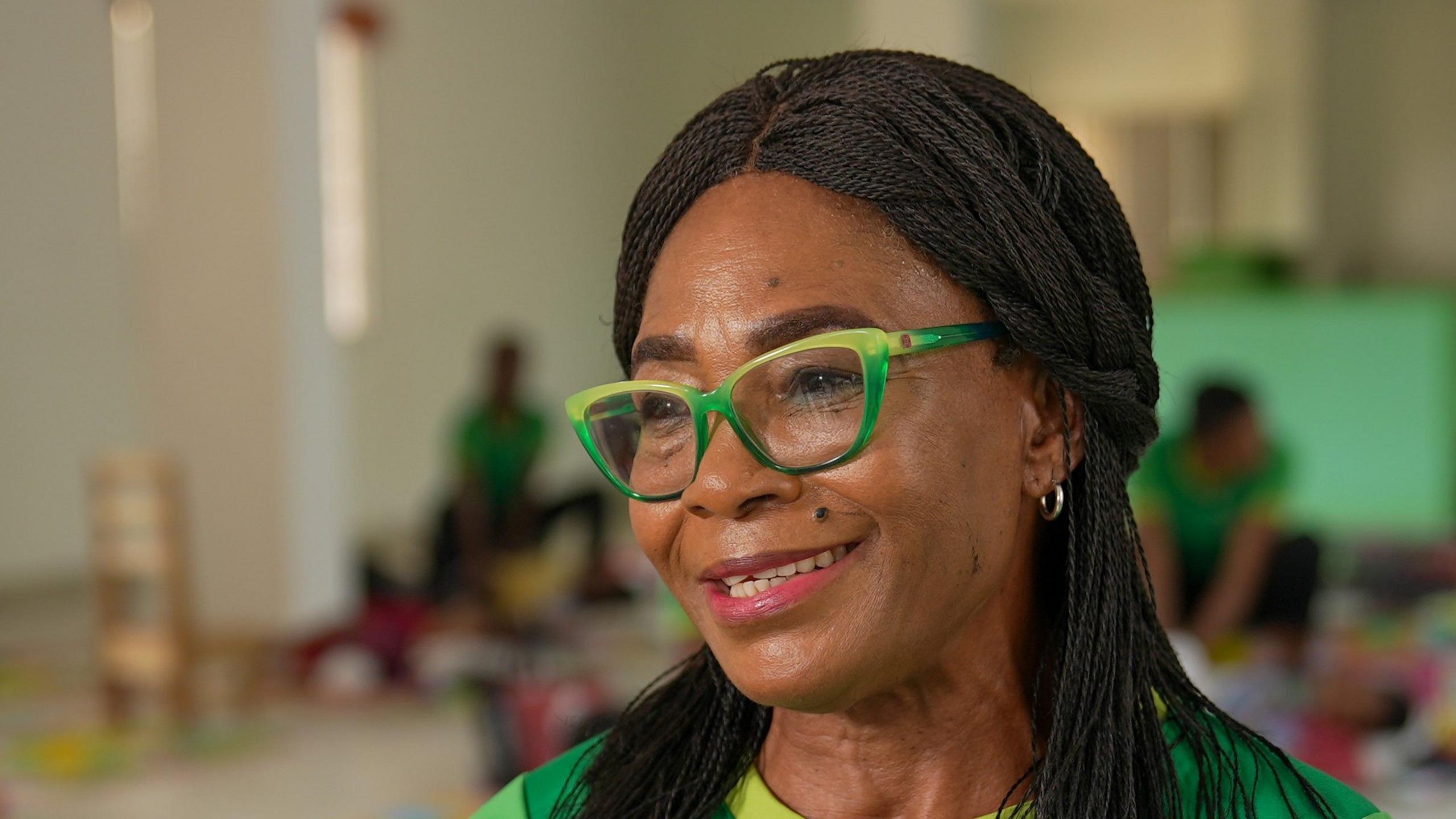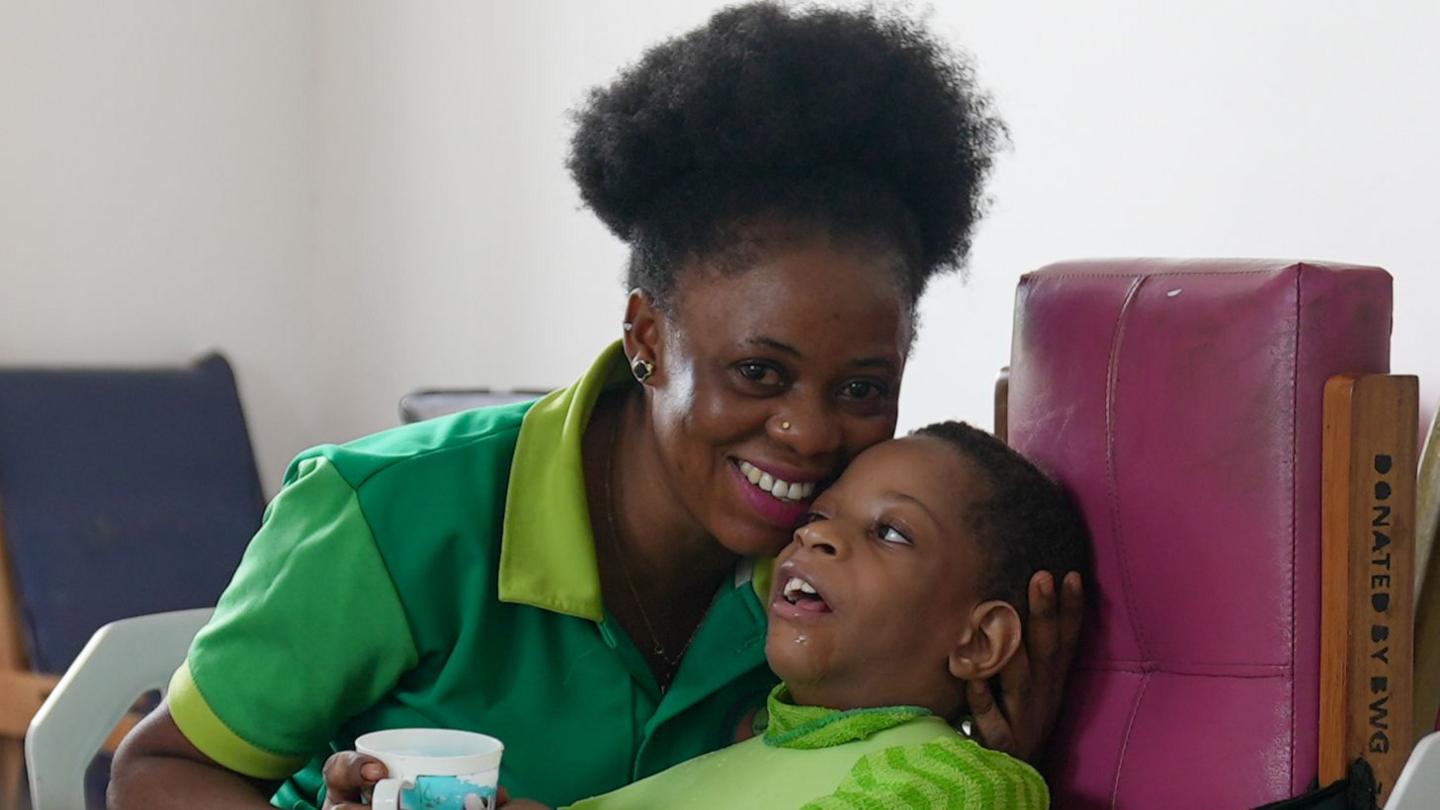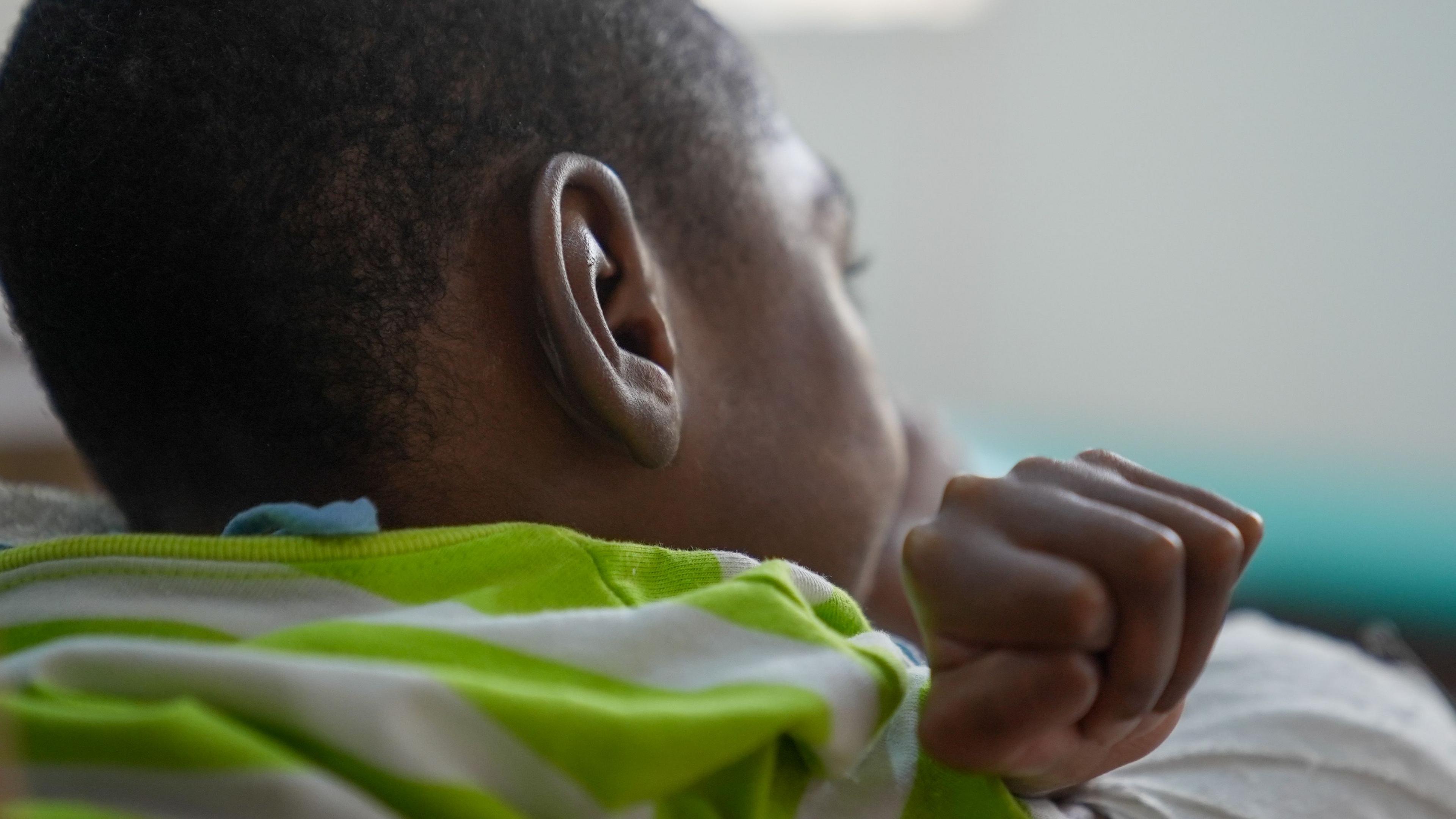'She's my life': A mother's mission to help Nigerians with cerebral palsy

- Published
Although Babatunde Fashola, affectionately known as Baba, is 22 years old, he is less than 70cm (2ft 4in) tall.
He has cerebral palsy and requires lifelong care. He can neither speak nor walk and is fed via a tube attached to his stomach.
As a baby, he was abandoned by his parents but 10 years ago, he found a home at the Cerebral Palsy Centre in the Nigerian city of Lagos.
"Baba weighs about 12kg [26lb]. He is doing well," the facility's founder, Nonye Nweke, tells me when I visit.
Ms Nweke and her staff work around the clock to support him and other youngsters living with permanent brain damage.
Although there is a lack of official data, cerebral palsy is believed to be one of the most common neurological disorders in Nigeria. In 2017, a medical professor from the University of Lagos said 700,000 people had the condition, external.
For many of those living with cerebral palsy in the country, their condition was caused by a common phenomenon among newborns - neonatal jaundice, external.
This is caused by a build-up of bilirubin, a yellow substance, in the blood, meaning the babies' skins have a yellow tinge.
Professor Chinyere Ezeaka, a paediatrician at the Lagos University Teaching Hospital, tells the BBC that more than 60% of all babies suffer from jaundice.
Most babies recover within days. More severe cases need further medical intervention - and even then the condition is easily treatable.
Children are basically exposed to ultra-violet light to dissolve the excess bilirubin in their red blood cells. The treatment lasts a few days depending on the severity.
However, in Nigeria this treatment is often not immediately available, which is why the country is among the five with the most neurological disorders caused by untreated jaundice in the world, according to data from the World Health Organization (WHO).
Any treatment for neonatal jaundice "must occur within the first 10 days of life, else [the condition] could cause permanent brain damage and severe cerebral palsy", says Prof Ezeaka.
To make matters worse, the West African country lacks facilities to care for those with neurological disorders. There are just three cerebral palsy centres, all privately run, in Nigeria, which has a population of more than 200 million.
Ms Nweke - a single mother - set up the Cerebral Palsy Centre after struggling to find support for her own daughter, Zimuzo.
"When I took her to a day-care [centre], they asked me to take her back because other mothers would withdraw their children. As a mum, I must say it was quite devastating," Ms Nweke tells the BBC.
Zimuzo is now 17, and Ms Nweke's Cerebral Palsy Centre provides full-time support for others with similar experiences.
On the day I visit, colourful playtime mats and toys are neatly arranged on the floor. Mickey Mouse and his friends converse on a wide-screen television in the lounge.
Twelve youngsters, some as young as five, gaze at the TV, their bright environment ignored for a moment. They are all immobile and non-speaking.

The Cerebral Palsy Centre cares for 12 children
At lunchtime, caregivers help the youngsters eat. Some take in liquified food through tubes attached to their stomachs.
Carefully and slowly, the carers support their heads with pillows and push the contents of their syringes into the tubes.
The youngsters are fed every two hours and require regular muscular massages to prevent stiffness.
But they are the lucky 12 receiving free care from the Cerebral Palsy Centre, which is funded exclusively by donors.
The facility has a long waiting list - Ms Nweke has received more than 100 applications.
But taking on more youngsters would require extra financial support. The cost of caring for someone at the centre is at least $1,000 (£790) a month - a huge amount in a country where the national minimum wage is about $540 a year.
"As a mum, I must say it's quite overwhelming. You have moments of depression, it gives you heartaches and it is quite expensive - in fact it's the most expensive congenital disorder to manage," Ms Nweke says.
"And then of course, it keeps you away from people because you don't discuss the same things. They are talking of their babies, walking, enjoying those baby moments. You are not doing that. You are sad," she adds.
Ms Nweke explains that she adopted Zimuzo from an orphanage.
A few months after taking her new daughter home, Ms Nweke realised Zimuzo was not developing in the same way as the children around her were. She was assessed at a hospital and diagnosed with cerebral palsy.
Ms Nweke was told she could take Zimuzo, who was then just a few months old, back to the orphanage and adopt another baby instead, but she refused.
"I decided to keep her and I began researching what the disorder was about, the treatment and type of care my child would need - she's my life.
"I was also told by the doctors she won't live beyond two years. Well here we are - 17 years later," says a smiling Ms Nweke.
A lack of awareness and adequate medical support hinders the diagnosis and treatment of neonatal jaundice in Nigeria.
Ms Nweke also says the common local belief that children with congenital disorders are spiritually damaged or bewitched leads to stigmatisation.
Some children with neurological disorders - mostly in Nigeria's rural areas - are labelled witches. In some cases, they are abandoned in prayer houses or cast out of their families.

Babatunde Fashola (above) has been at the centre for 10 years
Ms Nweke is not alone in her mission to dispel myths and improve care.
The Oscar Project - a charity aimed at improving the diagnosis and treatment of neonatal jaundice - recently began operating in Lagos.
The project is named after Vietnamese-born British disability advocate, Oscar Anderson, whose untreated jaundice caused his cerebral palsy.
"We're equipping health facilities at the primary, secondary and tertiary levels with the equipment to treat jaundice, primarily light boxes, but also detection and screening equipment," Toyin Saraki, who oversaw the launch, tells the BBC.
Project Oscar, backed by consumer health firm Reckitt, is training 300 health workers in Lagos. The hope over the first year is to reach 10,000 mothers, screen 9,000 children and introduce new protocols to try and prevent babies with jaundice from developing cerebral palsy.
In a country where the public health system is overstretched, the government has little to say about the disorder, although it lauded the Oscar project's goals.
Treatment for neonatal jaundice is significantly cheaper than the cost of lifelong care, doctors say.
First launched in Vietnam in 2019, Project Oscar has helped about 150,000 children in the Asian country.
Mr Anderson, 22, says he wants to prevent other children experiencing what he has been through.
"People with disabilities are not to be underestimated," he tells the BBC.
He is working to ensure screening for every newborn infant for neonatal jaundice, and, with the support and courage of mums, midwives and medical professionals, ensure there is better understanding and quicker treatment.
However, achieving this is a hugely ambitious goal in Africa's most-populous country, where thousands of babies are born each year with neonatal jaundice.
Regardless, Mr Anderson is determined to defy the odds.
"The work doesn't stop until every baby is protected against neonatal jaundice," he says.
More Nigeria stories from the BBC:

Go to BBCAfrica.com, external for more news from the African continent.
Follow us on Twitter @BBCAfrica, external, on Facebook at BBC Africa, external or on Instagram at bbcafrica, external